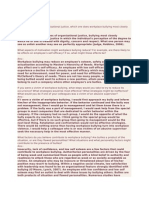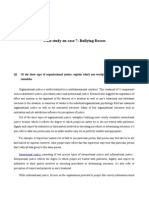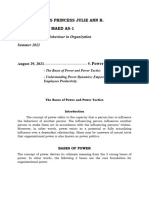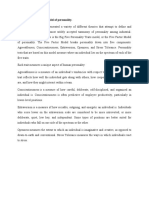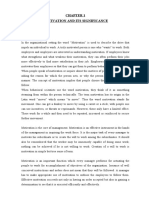0 ratings0% found this document useful (0 votes)
47 viewsBully"s Bosses 1
Bully"s Bosses 1
Uploaded by
MunimBullying in the workplace most closely resembles interactional injustice, where employees feel a lack of dignity, concern, and respect. Workplace bullying can reduce employees' self-esteem, security, and self-actualization according to Maslow's hierarchy of needs. It can also lower self-efficacy and decrease needs for achievement, power, and affiliation based on McClelland's theory of needs. If bullied, employees should first address the issue with the bully, then management, and if necessary seek help from employee advocacy groups. Retaliation should be avoided. Insecurity, lack of confidence, and low self-esteem can contribute to workplace bullying, as bullies may find an outlet to address their own issues
Copyright:
© All Rights Reserved
Available Formats
Download as DOCX, PDF, TXT or read online from Scribd
Bully"s Bosses 1
Bully"s Bosses 1
Uploaded by
Munim0 ratings0% found this document useful (0 votes)
47 views3 pagesBullying in the workplace most closely resembles interactional injustice, where employees feel a lack of dignity, concern, and respect. Workplace bullying can reduce employees' self-esteem, security, and self-actualization according to Maslow's hierarchy of needs. It can also lower self-efficacy and decrease needs for achievement, power, and affiliation based on McClelland's theory of needs. If bullied, employees should first address the issue with the bully, then management, and if necessary seek help from employee advocacy groups. Retaliation should be avoided. Insecurity, lack of confidence, and low self-esteem can contribute to workplace bullying, as bullies may find an outlet to address their own issues
Original Description:
Some aspects of bully's boss case
Original Title
Bullys
Copyright
© © All Rights Reserved
Available Formats
DOCX, PDF, TXT or read online from Scribd
Share this document
Did you find this document useful?
Is this content inappropriate?
Bullying in the workplace most closely resembles interactional injustice, where employees feel a lack of dignity, concern, and respect. Workplace bullying can reduce employees' self-esteem, security, and self-actualization according to Maslow's hierarchy of needs. It can also lower self-efficacy and decrease needs for achievement, power, and affiliation based on McClelland's theory of needs. If bullied, employees should first address the issue with the bully, then management, and if necessary seek help from employee advocacy groups. Retaliation should be avoided. Insecurity, lack of confidence, and low self-esteem can contribute to workplace bullying, as bullies may find an outlet to address their own issues
Copyright:
© All Rights Reserved
Available Formats
Download as DOCX, PDF, TXT or read online from Scribd
Download as docx, pdf, or txt
0 ratings0% found this document useful (0 votes)
47 views3 pagesBully"s Bosses 1
Bully"s Bosses 1
Uploaded by
MunimBullying in the workplace most closely resembles interactional injustice, where employees feel a lack of dignity, concern, and respect. Workplace bullying can reduce employees' self-esteem, security, and self-actualization according to Maslow's hierarchy of needs. It can also lower self-efficacy and decrease needs for achievement, power, and affiliation based on McClelland's theory of needs. If bullied, employees should first address the issue with the bully, then management, and if necessary seek help from employee advocacy groups. Retaliation should be avoided. Insecurity, lack of confidence, and low self-esteem can contribute to workplace bullying, as bullies may find an outlet to address their own issues
Copyright:
© All Rights Reserved
Available Formats
Download as DOCX, PDF, TXT or read online from Scribd
Download as docx, pdf, or txt
You are on page 1of 3
Bully"s Bosses
1. Out of the three types of organizational
justice, bullying most closely resembles
interactional justice in which the individual’s
perception of the degree to which he or she
is treated with dignity, concern and respect.
What one person may see as unfair another
may see as perfectly appropriate.
2. Workplace bullying may reduce an
employee’s esteem, safety and security, and
self actualization according to Maslow’s
Hierarchy of Needs. Workplace bullying can
also affect one’s self efficacy. An employee
with low self efficacy, when bullied, can
experience a decline in their already low self
efficacy which may decrease his/her need for
achievement, need for power, and need for
affiliation based on McClelland’s theory of
needs. There are not too many people, which
if they are being bullied would want to
achieve a new position, attain power, or even
want to belong to such a company where
other employee’s are bullies.
3. If I were a victim of workplace bullying, I
would first approach my bully and inform
him/her of the inappropriate behaviour. If
the behaviour continued and the bully was
not management, then I would go to
management and let them know there is a
problem. If the bully was a part of
management, I would seek help from the
special groups in most companies that are
dedicated to unfair behavior within the
company. If the company had no such group, I
would do the opposite of what the bully
expects my reaction to be. I think going to
the special group would be effective, but if
there is no such group then going to
management would be the next best thing.
Retaliation and confrontation would not be
effective strategies. There would be nothing
worse than having workplace bullying turn
into workplace violence. I would help a
colleague who is or was victims of an abusive
supervisor seek the necessary help in the
most effective manner.
4. Insecurity, lack of confidence, and low self
esteem are a few factors that could
contribute to workplace bullying.
Authoritarian personalities are driven by the
fear of being weak and summarized them as
people with a blind belief in authority and
readiness to attack those who are regarded as
weak or as socially acceptable as victims. An
employee who may be insecure or threatened
about loss of his/her position may resort to
bullying. Within a negative social climate,
low satisfaction with leadership was found to
be an organizational feature strongly
identified with bullying. An employee with
low confidence and low self esteem may find
an outlet to deal with these issues by bullying
others. Bullies are both products of situation
and flawed personalities. Numerous studies
have demonstrated that bullying is associated
with a negative and stressful working
environment.
You might also like
- Favoritism in The Workplace and Its Effect On The OrganizationDocument11 pagesFavoritism in The Workplace and Its Effect On The OrganizationSuhailShaikhNo ratings yet
- Bullying BossesDocument2 pagesBullying BossesChaudhary Faisal100% (2)
- Case Incident 2Document2 pagesCase Incident 2Lupita WidyaningrumNo ratings yet
- Ans. I Strongly Believe In-Equality and Comparison Are The Main FactorsDocument1 pageAns. I Strongly Believe In-Equality and Comparison Are The Main FactorsNithya Nanthini SithareaNo ratings yet
- How To Work With A Manipulative Person: Liz KislikDocument4 pagesHow To Work With A Manipulative Person: Liz KislikBudget MegamanilaNo ratings yet
- 27 Oct 1957 InterviewByAgronskyDocument10 pages27 Oct 1957 InterviewByAgronskyFarook IbrahimNo ratings yet
- Birksted-Breen, D. (1996) - Phallus, Penis and Mental SpaceDocument7 pagesBirksted-Breen, D. (1996) - Phallus, Penis and Mental Spaceofanimenoch100% (1)
- Frederick DouglassDocument2 pagesFrederick DouglassYanny WongNo ratings yet
- Assignment 2Document7 pagesAssignment 2RidhiNo ratings yet
- Case Incident: BULLYING BOSSESDocument2 pagesCase Incident: BULLYING BOSSESKenNo ratings yet
- Case Study 4Document1 pageCase Study 4Abdul Rehman QureshiNo ratings yet
- Week 3 Homework-Bullying CaseDocument1 pageWeek 3 Homework-Bullying CaseTerra PettryNo ratings yet
- Case+Incident+2 Chapter+7+Case BUSA333Document3 pagesCase+Incident+2 Chapter+7+Case BUSA333Izzat HamdanNo ratings yet
- Workplace Bullies: Case Study 2Document16 pagesWorkplace Bullies: Case Study 2Muhammad Akmal HussainNo ratings yet
- Retrospective Bullying Experiences SurveyDocument4 pagesRetrospective Bullying Experiences SurveySounak DeNo ratings yet
- Bullying Bosses Case Study by AivanDocument10 pagesBullying Bosses Case Study by AivanAivan Athin RomanNo ratings yet
- Workplace BullyingDocument6 pagesWorkplace Bullyingbiwithse7enNo ratings yet
- Case Study On Case 7: Bullying BossesDocument7 pagesCase Study On Case 7: Bullying BossesNurul Azurin Syukri AdnanNo ratings yet
- Assigment For Organization Behavior by Myo Kyaw Thu - MBA (Batch-8) - 1st DraftDocument8 pagesAssigment For Organization Behavior by Myo Kyaw Thu - MBA (Batch-8) - 1st DraftKyiNo ratings yet
- Assignment of Organizational Behavior: January, 2023 Addis Ababa, EthiopiaDocument10 pagesAssignment of Organizational Behavior: January, 2023 Addis Ababa, Ethiopiatage008100% (1)
- Workplace Bullying ThesisDocument53 pagesWorkplace Bullying Thesiskendall100% (1)
- HBR - Bullying Manifests at Work - and How To Stop ItDocument11 pagesHBR - Bullying Manifests at Work - and How To Stop ItKongsNo ratings yet
- The Politics of BackstabbingDocument8 pagesThe Politics of BackstabbingKhaled AbdulazizNo ratings yet
- Impact of Power and PoliticsDocument9 pagesImpact of Power and PoliticsAbdus Salam RatanNo ratings yet
- Bullyin in Law Enforcement End The SilenceDocument17 pagesBullyin in Law Enforcement End The SilenceSasha ANo ratings yet
- Chapter#7: Motivation ConceptsDocument4 pagesChapter#7: Motivation ConceptsAssad JafriNo ratings yet
- Unit 4 POWER AND POLITICSDocument10 pagesUnit 4 POWER AND POLITICSDilip KumarNo ratings yet
- How To Handle Manipulative PersonDocument3 pagesHow To Handle Manipulative PersonOvais AdenwallaNo ratings yet
- Edm 608 - Finals - Arnel CopinaDocument5 pagesEdm 608 - Finals - Arnel CopinaArnel CopinaNo ratings yet
- Quest International University Perak (Qiup) Faculty of Business, Management and Social SciencesDocument15 pagesQuest International University Perak (Qiup) Faculty of Business, Management and Social SciencesNicholasNo ratings yet
- NotesDocument7 pagesNotesNoreen CarlosNo ratings yet
- Ethics Ca 1Document17 pagesEthics Ca 1Abhijeet BhardwajNo ratings yet
- Case StudyDocument2 pagesCase StudyMuhammad QasimNo ratings yet
- Power Tool: Suman Rudra Power vs. InfluenceDocument10 pagesPower Tool: Suman Rudra Power vs. InfluenceCoach CampusNo ratings yet
- What Are The Five Forms of PowerDocument7 pagesWhat Are The Five Forms of PowerKangNo ratings yet
- Power and PoliticsDocument9 pagesPower and Politicsprincess julie ann bayogosNo ratings yet
- National Institute of Business Management: Name: Taher H Roll No: 110188 Enrolment No: MBA1/JUN18N/211301528456839FDocument10 pagesNational Institute of Business Management: Name: Taher H Roll No: 110188 Enrolment No: MBA1/JUN18N/211301528456839FTaher KagalwalaNo ratings yet
- GROUP 7's Paper - Power and PoliticsDocument10 pagesGROUP 7's Paper - Power and PoliticsSky CastleNo ratings yet
- Ten Personality TraitDocument13 pagesTen Personality TraitSubroto Ghosh100% (1)
- Human Relations Movement-1Document4 pagesHuman Relations Movement-1AmenNo ratings yet
- Discuss The "Big Five" Model of PersonalityDocument12 pagesDiscuss The "Big Five" Model of Personalityhtet sanNo ratings yet
- Unit-2 Q.14 What Do You Mean by Personality Traits? Ans. There Are Various Characteristics That Describe An Individual Behavior. PopularDocument27 pagesUnit-2 Q.14 What Do You Mean by Personality Traits? Ans. There Are Various Characteristics That Describe An Individual Behavior. PopularUsha Janardan MishraNo ratings yet
- HBO LECTURE 4 Personality & Individual DifferencesDocument46 pagesHBO LECTURE 4 Personality & Individual DifferencesKim BlancoNo ratings yet
- Unit 3 POWER AND POLITICSDocument10 pagesUnit 3 POWER AND POLITICSSãéèďNo ratings yet
- ED Report No. 4 Dark Side Theory of LeadershipDocument5 pagesED Report No. 4 Dark Side Theory of LeadershipAlexis BuenafeNo ratings yet
- Assignment Set - I A.1Document15 pagesAssignment Set - I A.1Akshay ChapatwalaNo ratings yet
- OTD 6Document7 pagesOTD 6Wycliff mwangiNo ratings yet
- Leadership Presentation..powerDocument5 pagesLeadership Presentation..powerAlishba SaleemNo ratings yet
- Q. What Are The Consequences of Conflict in Organisations?: AnswerDocument15 pagesQ. What Are The Consequences of Conflict in Organisations?: AnswerAbhijith IyengarNo ratings yet
- Power & LeadershipDocument25 pagesPower & Leadershipueki017100% (1)
- Q1. Define Motivation. Discuss The Various Theories of MotivationDocument14 pagesQ1. Define Motivation. Discuss The Various Theories of MotivationAshutosh MohantyNo ratings yet
- Learning Paper: Myers-Briggs Type Indicator (MBTI)Document6 pagesLearning Paper: Myers-Briggs Type Indicator (MBTI)Ramalu Dinesh ReddyNo ratings yet
- Hbo Finals ReviewerDocument12 pagesHbo Finals ReviewerNica Del RosarioNo ratings yet
- OB NMIMS AssignmentDocument7 pagesOB NMIMS AssignmentTajinder MatharuNo ratings yet
- OB Module PreparationDocument14 pagesOB Module PreparationDawit AsmelashNo ratings yet
- Ch3 - Personality, Perception and Attribution FinDocument11 pagesCh3 - Personality, Perception and Attribution FinAnyi ChngNo ratings yet
- Organiztional Behavior PDFDocument5 pagesOrganiztional Behavior PDFNinjaTomatoNo ratings yet
- Motivation and Its SignificanceDocument22 pagesMotivation and Its SignificanceAgam ShatodarNo ratings yet
- Individual Research by Rabia Topic 1Document5 pagesIndividual Research by Rabia Topic 1Gamin RabiaNo ratings yet
- Bullyproof Your Workplace: Strategies to Prevent Workplace BullyingFrom EverandBullyproof Your Workplace: Strategies to Prevent Workplace BullyingNo ratings yet
- Bullyproof Your Workplace: Strategies to Prevent Workplace Bullying: Strategies to Prevent Workplace BullyingFrom EverandBullyproof Your Workplace: Strategies to Prevent Workplace Bullying: Strategies to Prevent Workplace BullyingNo ratings yet
- Summary, Analysis & Review of The Arbinger Institute’s Leadership and Self-DeceptionFrom EverandSummary, Analysis & Review of The Arbinger Institute’s Leadership and Self-DeceptionNo ratings yet
- Bank Written Math Solution 1986-2020 With Faculty by Mohammad Arifur Rahman - Part - 03Document34 pagesBank Written Math Solution 1986-2020 With Faculty by Mohammad Arifur Rahman - Part - 03MunimNo ratings yet
- 2019 Bookmatter AgronomicCropsDocument17 pages2019 Bookmatter AgronomicCropsMunimNo ratings yet
- Focus Writing Book Part 1 LearninghomebdDocument80 pagesFocus Writing Book Part 1 LearninghomebdMunimNo ratings yet
- Be A Proud Professional Cost and Management AccountantDocument28 pagesBe A Proud Professional Cost and Management AccountantMunimNo ratings yet
- Sample PartDocument82 pagesSample PartMunimNo ratings yet
- 361 694 1 SMDocument5 pages361 694 1 SMMunimNo ratings yet
- We'Re Just Living It: Gen Z: We Didn'T Choose This LifeDocument24 pagesWe'Re Just Living It: Gen Z: We Didn'T Choose This LifeMunimNo ratings yet
- 25 Climate ActionsDocument14 pages25 Climate ActionsMunimNo ratings yet
- Labor Migration in AsiaDocument132 pagesLabor Migration in AsiaMunimNo ratings yet
- Types of Tea, Value Addition and ProductDocument9 pagesTypes of Tea, Value Addition and ProductMunimNo ratings yet
- The Study Report On Working Conditions of Tea Plantation Workers in BangladeshDocument92 pagesThe Study Report On Working Conditions of Tea Plantation Workers in BangladeshMunimNo ratings yet
- Preliminary Report On Household Income A PDFDocument154 pagesPreliminary Report On Household Income A PDFMunimNo ratings yet
- Overview of BASIC BankDocument5 pagesOverview of BASIC BankMunimNo ratings yet
- Tea J. Bangladesh 2013Document47 pagesTea J. Bangladesh 2013MunimNo ratings yet
- Robi Internship ReportDocument48 pagesRobi Internship ReportMunimNo ratings yet
- Term PaperDocument44 pagesTerm PaperMunimNo ratings yet
- Corporate Governance in BangladeshDocument7 pagesCorporate Governance in BangladeshMunimNo ratings yet
- Assignment Course: HIS 102.4 Prepared by Name ID MD Khairul Islam Pranto 1530 685 030Document6 pagesAssignment Course: HIS 102.4 Prepared by Name ID MD Khairul Islam Pranto 1530 685 030Khairul Islam PrantoNo ratings yet
- The World Today Is Turning More To Electronic Communications Such As The E-Mail, Facebook and Short Message System (SMS)Document3 pagesThe World Today Is Turning More To Electronic Communications Such As The E-Mail, Facebook and Short Message System (SMS)Teguh HardiNo ratings yet
- Mgnrega Project AnalysisDocument60 pagesMgnrega Project AnalysisBhavin JoshiNo ratings yet
- ORAL DEFAMATION - DE LEON vs. PEOPLEDocument2 pagesORAL DEFAMATION - DE LEON vs. PEOPLEIvy Clarize Amisola Bernardez100% (1)
- Summary AnalysisDocument3 pagesSummary AnalysisRazika AlmiraNo ratings yet
- Child Benefit: Data Classification RDocument16 pagesChild Benefit: Data Classification RDalia GomesNo ratings yet
- Regionalism in AsiaDocument4 pagesRegionalism in AsiaHalil ErenNo ratings yet
- Family Life TopicDocument4 pagesFamily Life TopicLinh ThùyNo ratings yet
- Summary of Let Freedom Ring by Barack ObamaDocument4 pagesSummary of Let Freedom Ring by Barack Obamaapi-314673560No ratings yet
- NCIP en Banc Resolution 145 S. 2009Document2 pagesNCIP en Banc Resolution 145 S. 2009Ernest Aton100% (1)
- Executive Attrition: at NTPCDocument9 pagesExecutive Attrition: at NTPCSamNo ratings yet
- Lesson 6Document32 pagesLesson 6rowena andres0% (2)
- War Peace ArticleDocument3 pagesWar Peace Articleapi-240724606No ratings yet
- 93A Demand To President of UMassDocument5 pages93A Demand To President of UMasskarenNo ratings yet
- Argumentative EssayDocument8 pagesArgumentative Essayapi-341098248No ratings yet
- Nepal Education in Figures 2016 PDFDocument26 pagesNepal Education in Figures 2016 PDFSudan ShresthaNo ratings yet
- Online Reading How Manipulators Do ItDocument4 pagesOnline Reading How Manipulators Do ItJoanna Felisa GoNo ratings yet
- 162:dharma Tanna: MET Institute of Management Prof. Shannon Sir Presented by 144: Shweta ShahDocument15 pages162:dharma Tanna: MET Institute of Management Prof. Shannon Sir Presented by 144: Shweta Shahyogeshdhuri22No ratings yet
- AVAWCDocument3 pagesAVAWCdaryllNo ratings yet
- Mind Control, Hypnosis and TortureDocument6 pagesMind Control, Hypnosis and TortureFrance Quenneville100% (2)
- Themes of Twleft NightDocument1 pageThemes of Twleft NightKainat TufailNo ratings yet
- Naukar by Anya Sitaram SynopsisDocument3 pagesNaukar by Anya Sitaram SynopsisJeromejeff Chan Chee KongNo ratings yet
- Why Caribbean History MattersDocument6 pagesWhy Caribbean History MattersAnonymous OeCloZYzNo ratings yet
- Get The Girl!Document6 pagesGet The Girl!Piero Mauricio Pesantes EscobarNo ratings yet
- Freedom To The SlaveDocument1 pageFreedom To The SlaveSayantan Mazumdar100% (10)
- BEGovSoc323 CSR 4Document24 pagesBEGovSoc323 CSR 4Romeo DupaNo ratings yet
- Nstp1-Activity m2 SibalDocument3 pagesNstp1-Activity m2 Siballightingmcqueen086No ratings yet

